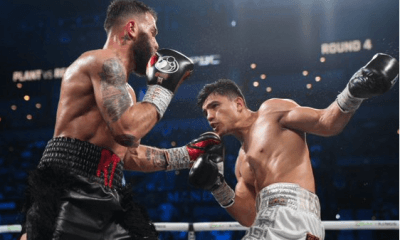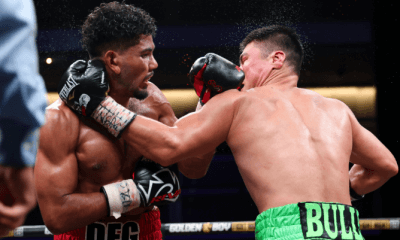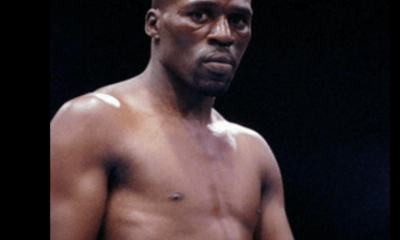Featured Articles
Dubai Poised to Mirror Saudi Arabia in the New World Order of Boxing

The royal family of Saudi Arabia is committed to making their fiefdom a major player in the world of professional boxing. The grand finale of the super middleweight tournament of the 2018 World Boxing Super Series (Callum Smith vs. George Groves) was held in Saudi Arabia as was Amir Khan’s last fight against overmatched Billy Dibs. Those fights, in retrospect, were overtures to the big shebang on Dec. 7, the rematch between Anthony Joshua and Andy Ruiz Jr.
Saudi Arabia’s next-door neighbor, the United Arab Emirates, is poised to join the party. Tomorrow’s show at the plush new Caesars Palace resort at Bluewaters, a man-made island overlooking Dubai, is the latest manifestation of the incursion of boxing into the Arab world.
This isn’t the first boxing show in Dubai. In 2008, former heavyweight champion Michael Moorer closed the curtain on his pro boxing career in Dubai, knocking out South Carolina no-hoper Shelby Gross in the opening round. That allowed Moorer to bookend his career with KOs in one, taking his leave on the same note on which he walked in the door. (You could probably win a few bar bets with this piece of trivia.)
When that odd event took place, there was only one registered professional boxer in all of the UAE.
That number is growing in leaps and bounds thanks to Ahmed Seddiqi, the driving force behind Dubai’s Round 10 Boxing Club. Founded in 2013, Round 10 is the first gym in Dubai built specifically for boxing.
Seddiqi (pictured on the left with his cousin and business partner Abdulla Khoory) subsequently became a regional manager for MTK Global, a powerful boxing management company with a murky past. His association with MTK Global, which is now headquartered in Dubai, gave him the resources to bring in fighters from overseas to spiff up his promotions. And the relationship between Top Rank and MTK Global gave Dubai boxing greater exposure via Top Rank’s affiliation with ESPN+.

Seddiqi and MTK Global manufactured the inaugural boxing show at Caesars Palace Dubai this past Sept. 13. The main event pitted Pakistan’s Muhammad Waseem against Conrado Tanamor of the Philippines. The super flyweights were penciled in to fight eight rounds.
Tomorrow’s show has a larger budget reflected in a more interesting main event. England’s Jack Catterall, ranked #1 by the WBO at 140 pounds, opposes Timo Schwarzkopf, the Kosovo-born German, in a match slated for 10.
The undefeated Catterall (24-0, 13 KOs) is on a collision course with WBC/WBO 140-pound title-holder Jose Carlos Ramirez. That bout will almost assuredly take place, notwithstanding the fact that the fans would much prefer to see Ramirez, the pride of Fresno, in a unification fight with Josh Taylor and that Ramirez’s next title defense will apparently come against Viktor Postol, a bout seemingly headed to China in February.
Catterall is handled by longtime British promoter Frank Warren who currently has a very cozy relationship with Ramirez’s promoter Bob Arum, an upshot of their shared financial interest in Tyson Fury. Being ranked #1 by the WBO carries sway with Arum who is a de facto member of the WBO Board of Directors. Arum’s current title-holders (Terence Crawford, Vasyl Lomachenko, Jamel Herring, Shakur Stevenson, Emanuel Navarrette, and Ramirez) sport WBO colors.
For Dubai locals, the undercard holds more appeal than the main event. Vijender Singh and Muhammad Waseem, who returns for an encore after knocking out Conrado Tanamor in the opening round, have built-in fan bases in a country where immigrants outnumber natives by a 9/1 margin with ex-pats from India (27.5 percent) and Pakistan (12.5 percent) comprising 40 percent of the total immigrant population.
Vijender Singh, 34, is a three-time Olympian. In 2008, in the second of his three Olympic engagements, he won the bronze medal — the first Olympic medal of any kind for a boxer from India. He returned to his homeland a national hero, a man who would transcend boxing in the world’s second-most populous country, appearing in layouts in popular fashion magazines and on numerous TV shows.
Singh (11-0, 8 KOs) signed a multi-fight contract with Top Rank in November of last year. His opponent, Charles Adamu, is a 42-year-old Ghanaian with a 33-14 record.
Adamu, who went 12 rounds with Carl Froch back in 2004, has been stopped only twice but Singh, despite being relatively inactive, expects to win comfortably. “I don’t expect him to put up too much of a challenge because I have noticed he is slower than me…So I am relaxed, nothing to worry there,” he told a reporter for the Hindustan Times.
In common with Singh, Muhammad Waseem (9-1, 7 KOs) is the most well-known boxer in a country where cricket is the national sport. The Quetta, Pakistan, native, 32, previously fought for the IBF world flyweight title, losing a close but unanimous decision to South Africa’s Moruti Mthalene in Kuala Lumpur.
Waseem has something in common with headliner Jack Catterall. Both spent an extensive amount of time in Las Vegas at the Mayweather Gym. Catterall helped Floyd Mayweather Jr prepare for his bout with Manny Pacquiao. For a time, Muhammed Waseem’s head trainer was Jeff Mayweather.
Waseem had a wealth of international amateur experience, but has answered the bell for only 61 rounds as a pro. By contrast, his Mexican opponent, former WBC light flyweight champion Ganigan Lopez (36-10, 19 KOs), has answered the bell for 311 rounds. It’s an interesting match, notwithstanding the fact that Ganigan, 38, was knocked out just six weeks ago by a journeyman in Mexico City.
In common with the first boxing show at Caesars Palace Dubai, tomorrow’s event is called the Rotunda Rumble. The Rotunda is the free-standing entertainment venue at the resort, a structure, says management, inspired by the Roman Pantheon although for most folks the referent would be an Eskimo’s igloo. Nearby on the island, accessible to the mainland by a causeway, sits the world’s largest ferris wheel.

Can boxing at Caesars Palace Dubai ever match the heyday of boxing at Caesars Palace in Las Vegas? That’s very doubtful. In Las Vegas, the early Caesars Palace shows in the indoor tennis pavilion were designed to showcase the property. The fights were televised on ABC’s Wide World of Sports. Management expected an increase in casino activity, but were surprised at the extent of the increase. Boxing, they quickly learned, was a magnet for high rollers, the impetus for raising the bar, begetting the outdoor extravaganzas.
Caesars Palace Dubai is a non-gaming hotel. There is no legal gambling in the Arab world. Moreover, the crowds at the fights in Dubai will never resemble the crowds at the big fights in Las Vegas where a secondary diversion is ogling the scantily-clad young women who arrive on the arms of their benefactors. Dubai is a country where an unmarried couple can be arrested for sharing a hotel room.
But let’s not sell Dubai short. You won’t find a pari-mutuel window at Dubai’s swanky Meydan Racecourse, but since 1996 the facility has been home to the world’s richest thoroughbred horse race. So, if the nation’s rulers become enamored of boxing, it’s a fair guess they will parrot neighboring Saudi Arabia and go all in.
Check out more boxing news on video at The Boxing Channel
To comment on this story in The Fight Forum CLICK HERE
-

 Featured Articles3 weeks ago
Featured Articles3 weeks agoThomas Hauser’s Literary Notes: Johnny Greaves Tells a Sad Tale
-
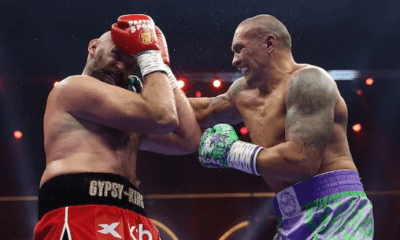
 Featured Articles2 weeks ago
Featured Articles2 weeks agoBoxing Notes and Nuggets from Thomas Hauser
-
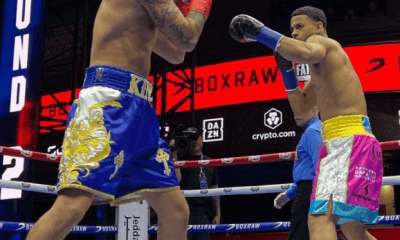
 Featured Articles4 weeks ago
Featured Articles4 weeks agoRolly Romero Upsets Ryan Garcia in the Finale of a Times Square Tripleheader
-
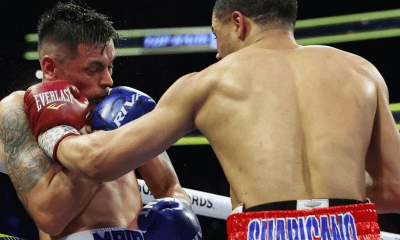
 Featured Articles4 weeks ago
Featured Articles4 weeks agoUndercard Results and Recaps from the Inoue-Cardenas Show in Las Vegas
-
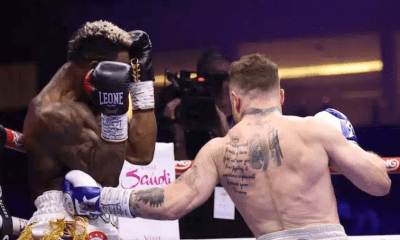
 Featured Articles4 weeks ago
Featured Articles4 weeks agoCanelo Alvarez Upends Dancing Machine William Scull in Saudi Arabia
-
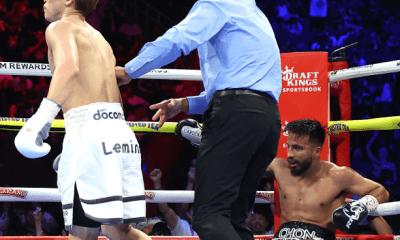
 Featured Articles4 weeks ago
Featured Articles4 weeks agoBombs Away in Las Vegas where Inoue and Espinoza Scored Smashing Triumphs
-
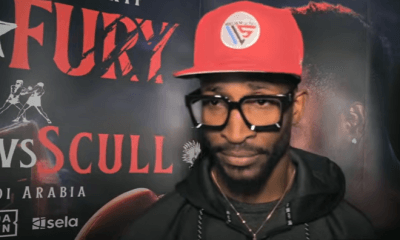
 Featured Articles4 weeks ago
Featured Articles4 weeks agoArne’s Almanac: The Good, the Bad, and the (Mostly) Ugly; a Weekend Boxing Recap and More
-
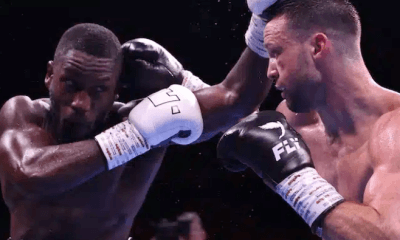
 Featured Articles1 week ago
Featured Articles1 week agoEkow Essuman Upsets Josh Taylor and Moses Itauma Blasts Out Mike Balogun in Glasgow

